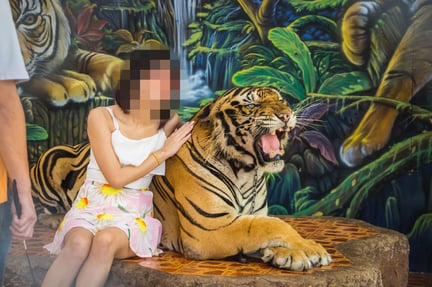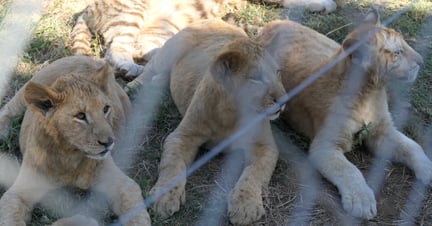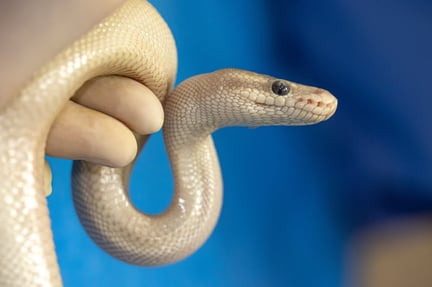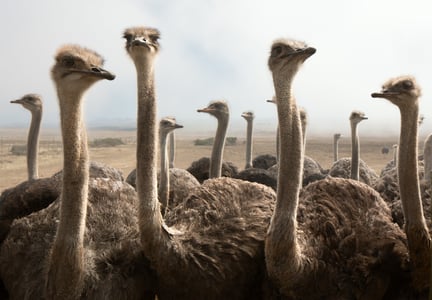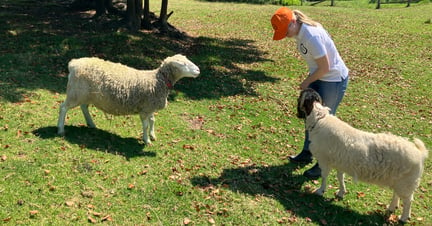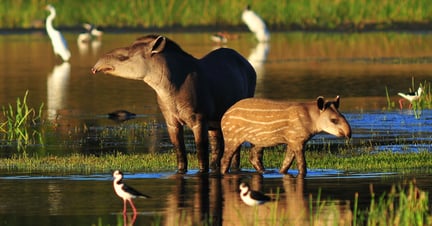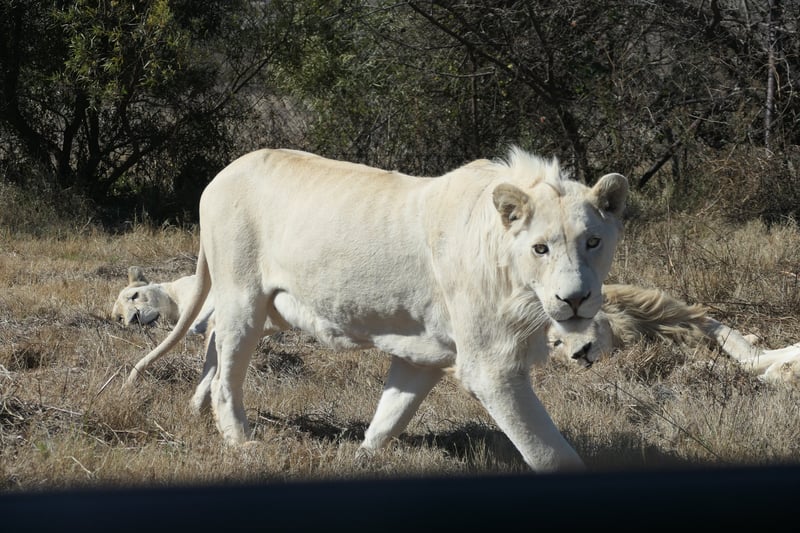
South Africa's government has laid out mandatory exit options for the captive lion industry. Discover why immediate steps are crucial and reflect on our journey with Blood Lions so far.
Lions in South Africa are essential, both as part of the natural ecosystem and as a symbolic and spiritual part of the national identity. But the launch of the captive lion breeding industry in the 1990s has had devastating effects on both wild and captive South African lions — and current efforts to reduce lion breeding and its impacts are just not enough.
This became particularly apparent when the South African Ministry of Forestry, Fisheries, and the Environment released a report recommending voluntary exit options for the captive lion industry. While a good stepping stone, World Animal Protection and our partners, Blood Lions South Africa, are advocating for stronger measures.
To explain why, let’s examine why lions in South Africa are endangered, how captive lion breeding contibutes to this despite governmental policies, and what further actions need to be taken to save South African lions.
Are lions in South Africa endangered?
South African lions are endangered — and captive lion breeding is largely to blame.
Though lions are wild animals, unsuited for living in captivity or in close proximity to humans, South Africa currently has more lions living in captivity than it does in the wild.
This is because, since the early 1990s, South Africa has allowed the captive breeding and keeping of lions. The industry initially started to supply hunting operations, but by 2008 it was supplying Southeast Asia with lion bones for traditional medicine and feeding commercial display and entertainment activities, like cub petting and walking with lions, in China, Thailand, Pakistan, Vietnam, and Bangladesh.
This increased demand had a devastating effect, substantially increasing the number of captive lions and breeding facilities. Since 2005, there has been a 675% increase in numbers of registered facilities (45 to 350) and a 220% increase in the numbers of lions held in captivity (2,500 to 8,000).
This growing industry threatens wild lions. It not only incentivises the capture of wild lions for breeding, leading to a reduction in wild populations, but sustaining the industry can divert resources away from conservation efforts aimed at protecting wild lion populations and their habitats.
What measures were put in place to help South African lions?
When Blood Lions South Africa’s award-winning documentary premiered in 2015 and exposed the harmful effects of captive lion breeding, new governmental policies were implemented to help South African lions — though to little benefit.
In 2019, the High Court declared the lion bone export quota unconstitutional, reducing it to zero. The illegal trade in lion bones continues, however, and enforcement is weak.
In 2021, the government pledged to end the exploitation of captive lions — including through captive lion breeding — and shut down the facilities that housed them.
By 2022, this had been watered down to creating “a voluntary exit strategy and pathways for captive lion facilities”.
These steps were taken in the right direction but they were not nearly forceful enough. However, Working towards “voluntary strategies” implies a lack of political will to make meaningful progress.
In 2024, over five years after our initial investigations into South Africa's commercial lions breeding industry, the mandatory phase out of captive lion breeding was confirmed in a new ministerial report.
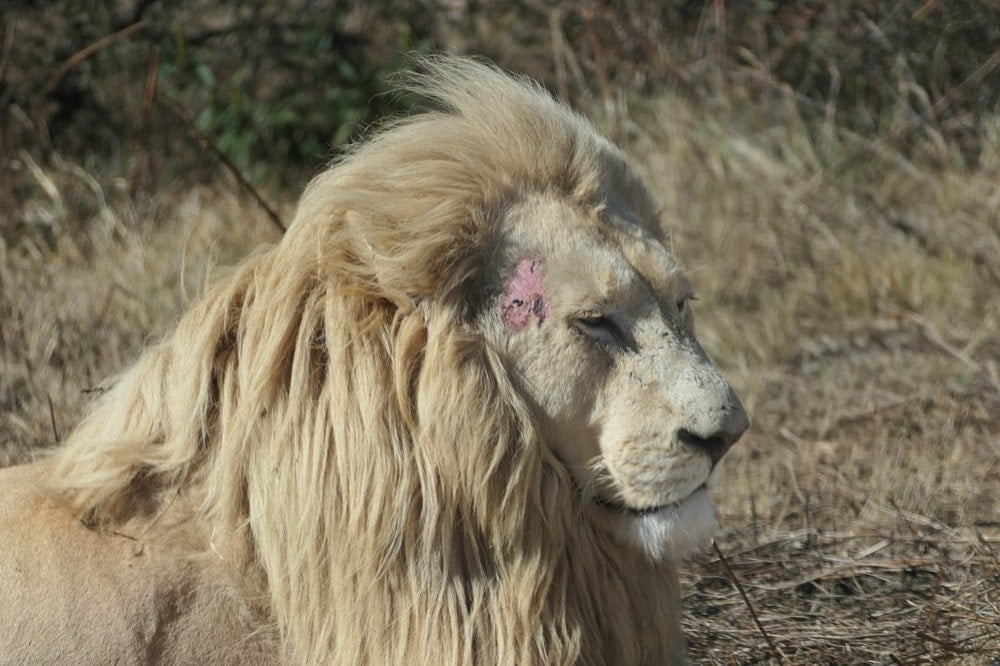
Is captive lion breeding in South Africa still a problem?
In partnership with Blood Lions South Africa, World Animal Protection has been working with credible sources (who must remain anonymous for their own safety) to investigate how captive lion breeding is changing in South Africa. Our findings are shocking.
Which means, despite a proposed phase out, the opportunity for lion farmers to legally provide canned hunts and trade lion bones domestically underscores the need for urgent action.
Canned hunting
Canned hunting involves lions being hunted by tourists for trophies in small enclosures, sometimes as little as a single hectare. Animals can be hunted within an hour of being released and are even drugged to make them easier to kill. All of these practices are illegal.
Government statements around breeding captive lions in South Africa aren’t slowing these facilities down. Instead, they are anticipating even more clients. It is estimated that 30 lions were hunted in just one facility in 2022 and many clients are booking repeat visits.
After being hunted, captive lions are processed and harvested for their skin, paws, skull, and bones, which will be sold off to collectors or “Asian bone buyers”.
Organised crime and exploitation
The lion bone industry is extremely lucrative, attracting the attention of organised crime. Groups who trade in South African lion bones often also sell rhino horns and other illegal animal body parts internationally. We found evidence of shell companies being used to export lion bones and potentially launder the profits.
Sources fear for their safety if they speak out
In line with other sectors infiltrated by organised crime, workers in captive lion farming facilities work in unsafe conditions with few rights. Our sources were justifiably afraid of reprisals on themselves or their families for speaking out to us.
Without transparent record-keeping and the ability for whistleblowers to raise concerns, it’s difficult to be sure of the true scale of the problem. This combines with high levels of corruption among law enforcement to further complicate efforts to protect captive lions.
Risks to lion welfare and public health
Wildlife farming is always wrong, but breeding captive lions comes with even greater risks. We saw evidence of lions living in tiny enclosures in extremely poor health with little or no veterinary care. This led to disease as well as abnormal behaviours including self-mutilation and excessive aggression.
In these conditions, lions carry pathogens that can spread within facilities affecting both lions and humans. The risk to human health is exacerbated by the lack of safety equipment for workers.
Poor conditions also lead to reports of big cats escaping from these facilities, further increasing the risks to workers and those unfortunate enough to live nearby.
Other species impacted
South African lions aren’t the only species being exploited at these facilities. Cheetahs, tigers, leopards, wolves, and even jackals are found in many of these facilities. Given the degree of secrecy involved in this trade, many more species may be affected.
How can we protect lions in South Africa moving forward?
The strongest message from the 'Putting a stop to cruelty: why South Africa's commercial captive lion industry should be shut down for good' report that we presented to the South African government was that voluntary steps to reduce or eliminate captive lion breeding simply were not enough. So we welcome the approval of a mandatory phase-out.
However, right now, lions are suffering in South Africa.
Until clear time-bound objectives are set, lions continue to suffer in inhumane conditions, legal trade will provide a cover for criminal activity, and farms continue to pose risk to public health and safety. The longer the industry continues, the more opportunity for harm endures.
Neil D'Cruze, Head of Animal Welfare & Research
Together with Blood Lions, we're determined to stop the cruel practices in South Africa's lion farming industry for good. So need to see a firm and committed timeline to put an end to unethical and cruel practices against lions from the South African government.
Together we will:
- Keep a watchful eye on new laws concerning the cruel lion farming industry in South Africa.
- Conduct necessary research and investigations to speed up the process and make informed decisions.
- Collaborate closely with Blood Lions to keep advocating and ensure the government follows through on its promises.
Related content
Ending commercial exploitation
Wildlife
Together we can drive down consumer demand and expose the lies of businesses that profit from cruelly exploiting wild animals.
What is wildlife farming?
Ending commercial exploitation
Wildlife farming is the commercial breeding and raising of wild animals. Learn how you can take action to prevent their exploitation.
